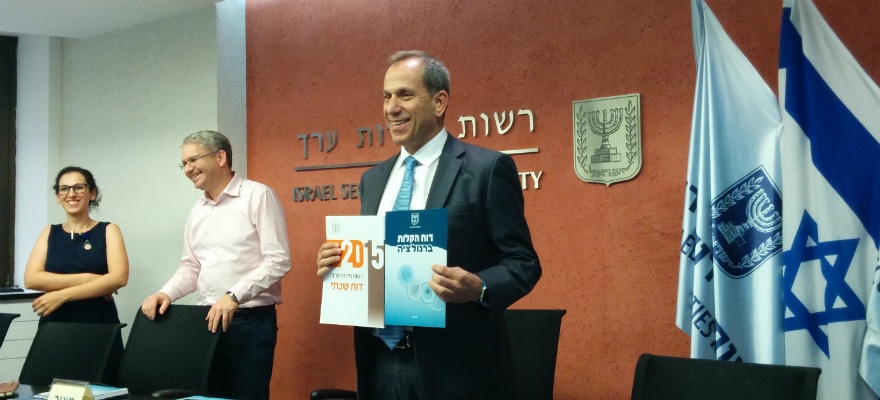Prof. Shmuel Hauser, head of the Israeli Securities Authority (ISA), announced today the establishment of a committee that will review the need to regulate initial coin offerings (ICO). The committee’s mandate is to examine whether ICOs and cryptocurrency trading are subject to Israeli securities laws.
ICOs, also known as token sales, have become a popular way for startups to raise funding and a lucrative investment opportunity for investors. Following a number of high profile ICOs in recent months, interest is rising among regulators across the globe. Yesterday t, stating that initial coin offerings are sometimes used to “convince potential victims to invest their money in scams.”
The committee will be headed by attorney Moti Yamin, Head of the ISA Corporate Department, and Dr. Gitit Gur-Gershgoren, the financial watchdog’s Chief Economist . The committee is due to submit its initial recommendations by December 31st, 2017.
Over $1 billion raised through ICOs in H1 2017
The committee’s mandate is to:
- Evaluate the financial essence of ICOs and whether it overlaps with other financial activity under Israeli law;
- Make a comparative analysis of cryptocurrency regulations in various countries to evaluate the legitimacy of Bitcoin;
- Examine if cryptocurrency trading and ICOs should be watched by the ISA;
- Devise a new regulatory policy balancing between alternative funding channels and technological innovation while protecting Israeli investors from unsupervised investments; and
- Examine potential collaborations with fellow regulators and with the local Blockchain industry.
According to the ISA, in H1 2017 over $1 billion was raised using through ICOs. “Israel is considered as a leading country in blockchcin technology development with a flourishing industry,” the ISA states. Recent local coin offerings have been successful but not flawless – in mid-July, a blockchain startup focused on cryptocurrency social trading, CoinDash,and more than $7 million worth of Ethereum stolen, which forced the company to .
In early August, the . The Stox token sale officially ended after hitting the hard-cap of 148,000 ETH – worth about $33 million at the current ETH/USD exchange rate.
The biggest local success story in terms of fundraising was definitely that of. This blockchain startup raised 396,619 ETH, which at the time was worth over $142 million. In exchange for the ETH that investors sent, Bancor issued them its own native token, BANCOR (BNT) – the first blockchain currency issued using its protocol.
Follow the Blockchain Podcast for exclusive interviews
These examples demonstrate the complex task that the ISA has undertaken. Bancor’s successful ICO also suffered numerous hacking attempts as the it unfolded, with massive malicious cyberattacks on its network. Though ultimately unsuccessful, hacking attempts could nonetheless undermine the firm’s ICO, which in turn would have exposed investors to theft. The ISA is addressing this issue, saying that some ICOs turned out to be fraudulent actions, damaging innocent investors, while others went wrong, with breaches exploited by hackers to steal money.
“In addition to that,” ISA’s announcement states, “some see ICOs as a financial bubble lacking any financial reasoning, and participating in some ICOs as a way to bypass current IPO regulations.”
“99.9% of these ICO companies will disappear”
Ofir Beigel, CEO of cryptocurrency information source 99Bitcoins, pours some cold water on the ICO hype: “The ICO market has become some sort of an OTC stock market which allows everyone to ‘join the party’. However, odds are that 99.9% of these ICO companies will disappear in the long run and so will their funding. While I really think this is a great and innovative way to raise funds, most of the public is still unaware of the huge risks it entails.
Government regulation for ICOs, if done properly and without stifling innovation, seems like a good initiative to protect the public. In general, every step towards regulation of cryptocurrencies brings us one step closer to mass adoption.”
Legal aspect
Nir Porat, Managing Partner at Porat and Co. Law Firm, which specializes in international trading, technology and internet, blockchain technology and cryptocurrencies, said: “Blockchain technology and other related initiatives stand to bring real improvements to our lives by offering solutions to problems that we are seeing in the technology-driven world of today.
Having said that, if left to operate without regulation and supervision, negative influences are sure to enter this realm, be they illegitimate coin offerings without sufficient foundation, hacking attacks, or thefts from digital wallets. We thus welcome the ISA’s initiative in flagging this issue with the goal of suggesting long term solutions.
There is no doubt that the process of setting up appropriate regulatory procedures will bring with it many difficulties, not least among them the challenges of detection and enforcement. The Israeli authorities (in common with authorities worldwide) do not necessarily have the ability to monitor every one of the countless transactions that are executed through the internet, which is the realm in which the blockchain is located.
The Israeli regulator needs to set appropriate monitoring and enforcement guidelines, while at the same time checking that it is creating a fair and balanced regulatory framework. This framework should protect the public but not apply unfair weight upon companies in the market, lest it stifle innovation and profitability.”





Be First to Comment